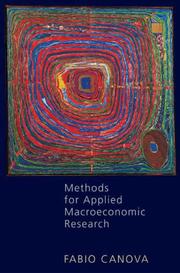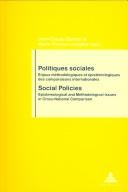| Listing 1 - 10 of 16 | << page >> |
Sort by
|
Book
ISBN: 1781907781 178190779X 9781781907795 9781781907788 9781781907788 Year: 2013 Publisher: Bingley, United Kingdom
Abstract | Keywords | Export | Availability | Bookmark
 Loading...
Loading...Choose an application
- Reference Manager
- EndNote
- RefWorks (Direct export to RefWorks)
Some 20 years after the emergence of configurational theory as a key perspective in organization studies in the 1990s, this approach has yet to deliver on its promise. While we know that configurations the relative arrangement of parts and elements - matters, empirical research on configurations is just beginning to deliver on its promise.
Organization -- Research -- Methodology. --- Organizational behavior -- Research -- Methodology. --- Organizational sociology -- Research -- Methodology -- Case studies. --- Organizational sociology -- Research -- Methodology. --- Management --- Business & Economics --- Management Styles & Communication --- Organizational behavior --- Research --- Methodology. --- Behavior in organizations --- Organization --- Psychology, Industrial --- Social psychology --- Research&delete& --- Methodology --- E-books --- Organizational theory & behaviour. --- Business mathematics & systems. --- Organizational Behavior.
Book
ISBN: 3954891743 3954896745 9783954896745 9783954891740 Year: 2014 Publisher: Hamburg, Germany
Abstract | Keywords | Export | Availability | Bookmark
 Loading...
Loading...Choose an application
- Reference Manager
- EndNote
- RefWorks (Direct export to RefWorks)
This book presents a theoretical framework of Elicitation Questions. Elicitation questions are the most important aspect of second language learning ability. Understanding the purposes and the conditions in which questions work best will help one master their use. Questioning is not only one of the most important skills in language learning, but also one of the main objectives of learning English in our schools. Although there are a number of definitions, it seems that the term 'question' has never been clearly defined. With the changes occurring within the linguistic theories, the term has be
Business -- Research -- Methodology. --- Business --- Research --- Methodology. --- Research&delete& --- Methodology --- E-books --- Trade --- Economics --- Management --- Commerce --- Industrial management
Book
ISBN: 9782713222702 2713222702 Year: 2011 Volume: 2 Publisher: Paris: Éditions de l'EHESS,
Abstract | Keywords | Export | Availability | Bookmark
 Loading...
Loading...Choose an application
- Reference Manager
- EndNote
- RefWorks (Direct export to RefWorks)
Economics --- Social sciences --- Research --- Methodology --- AA / International- internationaal --- 330.3 --- Methode in staathuishoudkunde. Statische, dynamische economie. Modellen. Experimental economics. --- Behavioral sciences --- Human sciences --- Sciences, Social --- Social science --- Social studies --- Economic theory --- Political economy --- Research&delete& --- Methode in staathuishoudkunde. Statische, dynamische economie. Modellen. Experimental economics --- Civilization --- Economic man --- Economics - Research - Methodology --- Social sciences - Research - Methodology --- Sciences sociales --- Économie politique --- Méthodologie
Book
ISBN: 9780691144009 0691144001 9786613101525 1400838851 1283101521 9781400838851 6613101524 9781283101523 Year: 2011 Publisher: Princeton, N.J. : Princeton University Press,
Abstract | Keywords | Export | Availability | Bookmark
 Loading...
Loading...Choose an application
- Reference Manager
- EndNote
- RefWorks (Direct export to RefWorks)
The Poverty of Clio challenges the hold that cliometrics--an approach to economic history that employs the analytical tools of economists--has exerted on the study of our economic past. In this provocative book, Francesco Boldizzoni calls for the reconstruction of economic history, one in which history and the social sciences are brought to bear on economics, and not the other way around. Boldizzoni questions the appeal of economics over history--which he identifies as a distinctly American attitude--exposing its errors and hidden ideologies, and revealing how it fails to explain economic behavior itself. He shows how the misguided reliance on economic reasoning to interpret history has come at the expense of insights from the humanities and has led to a rejection of valuable past historical research. Developing a better alternative to new institutional economics and the rational choice approach, Boldizzoni builds on the extraordinary accomplishments of twentieth-century European historians and social thinkers to offer fresh ideas for the renewal of the field. Economic history needs to rediscover the true relationship between economy and culture, and promote an authentic alliance with the social sciences, starting with sociology and anthropology. It must resume its dialogue with the humanities, but without shrinking away from theory when constructing its models. The Poverty of Clio demonstrates why history must exert its own creative power on economics.
Economics --- Economie politique --- Research --- Methodology. --- History. --- Recherche --- Méthodologie --- Histoire --- Methodology --- History --- Économie politique --- AA / International- internationaal --- 331.100 --- Economische geschiedenis: algemeenheden. --- Economics - History. --- Economics - Research - Methodology. --- Economics --History. --- Economics --Research --Methodology. --- Business & Economics --- Economic Theory --- Méthodologie --- Economic theory --- Political economy --- Social sciences --- Economic man --- Research&delete& --- E-books --- Economische geschiedenis: algemeenheden --- Histoire. --- Méthodologie. --- Douglass North. --- Karl Polanyi. --- Moses Finley. --- Witold Kula. --- cliometrics. --- cultural history. --- culture. --- economic history. --- economic reasoning. --- economic system. --- economic theory. --- economy. --- individualism. --- institutional approach. --- intellectual crisis. --- materialism. --- medieval economics. --- neoclassical economics. --- neoclassical microeconomics. --- neoliberal economics. --- past generations. --- policy recommendations. --- social history. --- social science history. --- social science. --- universality. --- worldviews. --- Economics - Research - Methodology --- Economics - History --- Économie politique --- Méthodologie.
Book
ISBN: 9781848447547 184844754X 9780857938244 085793824X Year: 2011 Publisher: Cheltenham: Elgar,
Abstract | Keywords | Export | Availability | Bookmark
 Loading...
Loading...Choose an application
- Reference Manager
- EndNote
- RefWorks (Direct export to RefWorks)
Methodology of economics --- AA / International- internationaal --- 330.3 --- Methode in staathuishoudkunde. Statische, dynamische economie. Modellen. Experimental economics. --- Economics --- Methodology --- Research --- Economic theory --- Political economy --- Social sciences --- Economic man --- Research&delete& --- Methode in staathuishoudkunde. Statische, dynamische economie. Modellen. Experimental economics --- Economics - Methodology --- Economics - Research - Methodology

ISBN: 9780691115047 0691115044 140084102X Year: 2007 Publisher: Princeton: Princeton university press,
Abstract | Keywords | Export | Availability | Bookmark
 Loading...
Loading...Choose an application
- Reference Manager
- EndNote
- RefWorks (Direct export to RefWorks)
The last twenty years have witnessed tremendous advances in the mathematical, statistical, and computational tools available to applied macroeconomists. This rapidly evolving field has redefined how researchers test models and validate theories. Yet until now there has been no textbook that unites the latest methods and bridges the divide between theoretical and applied work. Fabio Canova brings together dynamic equilibrium theory, data analysis, and advanced econometric and computational methods to provide the first comprehensive set of techniques for use by academic economists as well as professional macroeconomists in banking and finance, industry, and government. This graduate-level textbook is for readers knowledgeable in modern macroeconomic theory, econometrics, and computational programming using RATS, MATLAB, or Gauss. Inevitably a modern treatment of such a complex topic requires a quantitative perspective, a solid dynamic theory background, and the development of empirical and numerical methods--which is where Canova's book differs from typical graduate textbooks in macroeconomics and econometrics. Rather than list a series of estimators and their properties, Canova starts from a class of DSGE models, finds an approximate linear representation for the decision rules, and describes methods needed to estimate their parameters, examining their fit to the data. The book is complete with numerous examples and exercises. Today's economic analysts need a strong foundation in both theory and application. 'Methods for Applied Macroeconomic Research' offers the essential tools for the next generation of macroeconomists.
Macroeconomics --- Quantitative methods (economics) --- Research --- Methodology --- Mathematical models --- AA / International- internationaal --- 305.0 --- -Macroeconomics --- -339.0724 --- Economics --- Toegepaste econometrie en statistiek (algemene naslagwerken). Statistische onderzoekingen en studiën. --- Econometric models --- Mathematical models. --- Methodology. --- 339.0724 --- Research&delete& --- Toegepaste econometrie en statistiek (algemene naslagwerken). Statistische onderzoekingen en studiën --- Macroeconomics - Research - Methodology --- Macroeconomics - Mathematical models
Book
ISBN: 9780199646890 0199646899 9780198745396 0198745397 019166474X 9780191664748 Year: 2015 Publisher: Oxford: Oxford university press,
Abstract | Keywords | Export | Availability | Bookmark
 Loading...
Loading...Choose an application
- Reference Manager
- EndNote
- RefWorks (Direct export to RefWorks)
This title brings together leading organisation scholars and business historians to examine the opportunites and challenges of incorporating historical research into the study of firms and markets.
Business enterprises --- Organizational sociology --- Comportement organisationnel --- Sociologie des organisations --- Historiography. --- Research --- Methodology. --- Histoire. --- Recherche. --- Organization (Sociology) --- Organization theory --- Sociology of organizations --- Sociology --- Bureaucracy --- Business organizations --- Businesses --- Companies --- Enterprises --- Firms --- Organizations, Business --- Business --- Organizational sociology. --- History. --- Historiography --- Research&delete& --- Methodology --- E-books --- Entreprises --- Recherche --- Business enterprises - Historiography --- Organizational sociology - Research - Methodology
Book
ISBN: 9781107185159 9781316636398 1316636399 1107185157 1316636402 9781316636404 1316952746 1316946517 9781316952740 9781316946510 Year: 2012 Publisher: Cambridge : Cambridge University Press,
Abstract | Keywords | Export | Availability | Bookmark
 Loading...
Loading...Choose an application
- Reference Manager
- EndNote
- RefWorks (Direct export to RefWorks)
If treated as a single economy, the European Union is the largest in the world, with an estimated GDP of over 14 trillion euros. Despite its size, European economic policy has often lagged behind the rest of the world in its ability to generate growth and innovation. Much of the European economic research itself often trails behind that of the USA, which sets much of the agenda in mainstream economics. This book, also available as open access, bridges the gap between economic research and policymaking by presenting overviews of twelve key areas for future economic policy and research. Written for the economists and policymakers working within European institutions, it uses comprehensive surveys by Europe's leading scholars in economics and European policy to demonstrate how economic research can contribute to good policy decisions, and vice versa, demonstrating how economics research can be motivated and made relevant by hot policy questions.
Economics --- Research --- Policy sciences --- Europe --- Economic conditions. --- Economic policy. --- 334.151.0 --- EG beleid: Algemeenheden --- European Union countries --- Economic theory --- Political economy --- Social sciences --- Economic man --- Economics - Research - European Union countries --- economic research --- research methodology --- macroeconomics --- microeconomics --- economic policy --- European Union --- economic growth

ISBN: 0820466549 9052012946 9789052014203 9789052012940 9052014205 9780820466545 Year: 2008 Volume: 51 Publisher: Bruxelles: Peter Lang,
Abstract | Keywords | Export | Availability | Bookmark
 Loading...
Loading...Choose an application
- Reference Manager
- EndNote
- RefWorks (Direct export to RefWorks)
Social policy --- Welfare state --- Social service --- Research --- Methodology --- Politiques sociales --- Openbare onderstand en weldadigheid. Menslievendheid. Sociaal hulpbetoon. --- #SBIB:316.8H40 --- #SBIB:35H437 --- 301 --- 313 --- 361 --- AA / International- internationaal --- Benevolent institutions --- Philanthropy --- Relief stations (for the poor) --- Social service agencies --- Social welfare --- Social work --- Human services --- National planning --- State planning --- Economic policy --- Family policy --- Social history --- Research&delete& --- Sociaal beleid: social policy, sociale zekerheid, verzorgingsstaat --- Beleidssectoren: sociale zekerheid --- Techniek van statistische inlichtingen. Organisatie van de statistische enquêtes. Statistische kritiek --- Levenswijze en levensstandaard. Levensminimum. sociale indicatoren (Studiën) --- Openbare onderstand en weldadigheid. Menslievendheid. Sociaal hulpbetoon --- Politique sociale --- État providence --- Service social --- Recherche --- Méthodologie --- Etat providence --- Cross-cultural studies. --- Methodology. --- Etudes transculturelles --- Méthodologie --- Méthodologie. --- Social policy - Research - Cross-cultural studies --- Welfare state - Cross-cultural studies --- Social policy - Research - Methodology --- Social service - Research - Methodology --- Politique sociale - Recherche --- Politique sociale - Méthodologie --- Kennisleer

ISBN: 0761966323 0761966331 1446275817 1849209685 9781446275818 9780761966326 Year: 2002 Publisher: London: Sage,
Abstract | Keywords | Export | Availability | Bookmark
 Loading...
Loading...Choose an application
- Reference Manager
- EndNote
- RefWorks (Direct export to RefWorks)
This text brings together the seminal works in the field together with editorial introductions to assist the reader in understanding the essential principles of qualitative research.
Information systems --- Qualitative research --- Management information systems --- Information resources management --- Methodology --- Research --- -Management information systems --- -#SBIB:303H32 --- #SBIB:043.IOS --- Qualitative analysis (Research) --- Qualitative methods (Research) --- Computer-based information systems --- EIS (Information systems) --- Executive information systems --- MIS (Information systems) --- Sociotechnical systems --- Management --- Corporations --- Information resource management --- Information systems management --- IRM (Information resources management) --- Research. --- Waarneming en participerende waarneming, gecontroleerde observatie, groepsdiscussie (vragenlijsten, interviews, experimenten) --- Communication systems --- #SBIB:303H32 --- E-books --- Methodology. --- Qualitative research - Methodology --- Management information systems - Research --- Information resources management - Research
| Listing 1 - 10 of 16 | << page >> |
Sort by
|

 Search
Search Feedback
Feedback About UniCat
About UniCat  Help
Help News
News